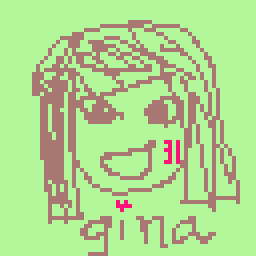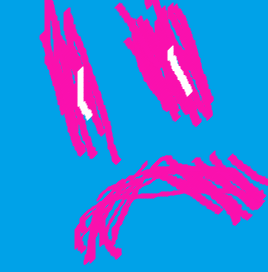hammer of witches
The doctor strode, his
shoulders high, through the corridor leading to his office, saluting the
security officers. He flew past doors that read “Professor Dietz –
Mathematics”, “Professor Roman – Literacy”; names no longer meaningful, in a
place no longer a school. The doctor gave it a new purpose: A home for hope. A
home for science.
A line of girls stood next
to the clinical room. Low faces, sad bob haircuts, soiled white gowns. They
looked at him, sharply, with bags under their eyes. The doctor nodded at each
one. Only one hand was shaking, waving. It was little Gina, label Thirty-one.
She was smiling.
The doctor lowered his
gaze, sighed, and reached to his office. Another Monday, and again, with no
weekend to rest.
He called for Joanna, if
she was awake. Nurses brought her in without wasting a minute, as it was the
rule.
Joanna, label Six, barely
stood, with the two nurses helping her. With 2.3 kilograms of steel and
silicate wired to her brain, standing was an achievement. She rose slowly and
salivated – her way to show she was ready to communicate.
“Joanna, how are you?” the
doctor muttered, invariable tone. “My dear, you are the eldest guest in the
facility, our pride.”
“Yes, yes,” she grunted,
fixated on him, eyes almost out of orbit.
“I need to ask you a
favour. You need to motivate the girls a bit. Did you see them this morning? I
know, there is a lot of work ahead of them, but the look in their eyes! I don’t
understand.” He bent to her. “I do the best for them. My dear, did you try the
soda and mutton yesterday? I ordered that, for you, my guests, to please you.”
“The girls…haven’t slept
for days,” Joanna said. “They are exhausted. Stressed. They look at me, my
body, and know one day they’ll end like me. They fear, Doctor.”
“But they shouldn’t!” the
doctor yapped. “Don’t they know what they are? I tell them, every
time, how important – how unique they are.”
The woman followed every
sentence, nodding.
“You know, how I personally
invest into your wellbeing! Others out there, you know, are not so lucky,” he
said, pointing at the gray photo at the wall, lined girls at the yard of a
concentration camp. “We are all working hard, doing wonders to science. You
can’t sleep? I can’t sleep! Meanwhile, the soldiers at the front are dying out
there, bombs, explosions. You’ve been there, Joanna. You should know best that
our efforts here will save lives.”
So many lives. He repeated
that to himself every night, kneeling by the cross at his bedside.
“Seeing the girls like
this,” he continued, “makes me feel like I’m doing bad things. Help me,
Joanna!”
Joanna was half collapsed
again, but nodded.
“Yes, Doctor. I’ll talk to
them”.
Every day went by with
moments of hope and misery. He would return home, to his loneliness, and his
necessary prayers, with a greyer shade on his skin.
Joanna and the scornful
eyes accompanied in his sleep, his mind scarred with fierce images. No tonic
could help against the migraine, but with time, as always did, his
consciousness would drift into the void.
Or so he thought. 11:50,
his clock menaced. He hurried away, chugged his painkiller, and off to the
dilapidated school building again.
It was a strange day, with
the sun high – a rare sight. It hurt to see it. Coping with the migraine, he
shoved past the double doors, ignoring everything and everyone.
He coughed. A dry smell
made him hack uncontrollably. He was in the lobby. And the lights, they weren’t
on. And nobody was on desk.
“Tanya?”
No answer.
“What the hell happened
here?”
He scrambled through the
darkness. The pains returned with a flash of light – someone turned it on. It
was Number Thirty-one, the waving girl.
“Gina?”
She’d smile as ever, with
her gown as dirty. She approached, and laid out her hand. Soon she was carrying
him by the arm, like a warm bride. He felt old.
With his shoulders thin, he
strode through the corridor, Gina by his side, into the dark. Their feet lay
stiff on every step, rising something into the air. Gina pulled gently, with
her countenance dimmed. It could have been someone else, but he felt her usual
gestures, her gait. Dark lines and large black spots followed the corridor’s
edges. Gina carried on, without a word. All these weeks she’d been his guest,
he never heard her say a word. He was a good girl – he always thought.
As she opened the door to
the office, migraine struck again with the light, and a gust of wind brushed,
hot, heavy. Joanna was waiting there: crooked, wretched, dirty, but taller than
ever.
“Joanna? What happened
here?”
Joanna nodded. The doctor
felt Gina’s grasp loosen. She pattered back, juvenile, away from him.
“You’ve kept us here for
your war,” Joanna muttered. “But a new war has started.”
“I’m not using anyone,
Joanna. And war? You know all I want, is to save lives.”
Her eyes did not believe
him.
“Joanna, tell me. What
happened here?”
“You talk as if you were
our ally, but we remember. Even if you try to drug us, my sisters and I
remember.”
“Carry on,” he asked. He
strode around. He must reach the drawer under his desk as soon as possible.
“You don’t want us to heal
anyone. You want us to be your weapons.”
Weapons. As every army
officer, the doctor had a gun under the desk.
“Doctor,” she continued,
her voice just as low. “I’m not even sure if you care about the war. No. You
have an agenda, right?”
His eyes rushed to the iron
handle. He pulled to no success. Someone had forced the drawer upside down.
“I know exactly what you
search, Doctor. You won’t find it there.”
She paused.
“You can feel it, Doctor,
don’t you?”
It wasn’t stress or
migraine. Something charged his lungs with something they couldn’t withstand.
“The air,” the doctor said.
“What are you doing to the air?”
“I only put in practice
what you discovered.”
“I never meant you harm. I
swear—” he attempted to say, his breath struggling, “to God! I only did my best
in my position! You know!”
“I know, Doctor. Discovery,
fame, wealth. It’s what people like you care about.”
Strength failed. Suddenly
he didn’t feel like standing.
“My sisters and I have to
free ourselves. It’s our new war. And we need you. You may carry your research,
only that, you will serve our interests, not yours. But for now, Doctor, it’s
going to be a very long day...”



Comments
Post a Comment